Rwandan Woman Pleads Not To Be Deported From Canada
 Charlotte Umutesi
Charlotte UmutesiKigali: The French-Canadian Association of Alberta is urging the Canadian federal immigration minister not to deport a woman living in the same province (Edmonton area) who says she will be killed if she returns to Rwanda.
Charlotte Umutesi, 35, fled Rwanda five years ago. She said she left after testifying against the man who killed her family during the 1994 Rwandan Genocide.
She claims that in the days after her testimony, the man beat and raped her, and threatened to kill her if she testified again. Few details about the man are available and the case is just becoming public.
Her request for asylum was rejected by Canadian immigration officials in March 2007.
In January, the Canadian federal government lifted a moratorium on deporting people to countries formerly considered insecure ďż˝ such as Rwanda.
Two weeks ago, an immigration officer told Umutesi she would be sent back to Rwanda.
“I tell her, I say I’m working ďż˝ I live in Canada [for] five years,” Umutesi told Canadian Broadcasting Corporation News (CBC).
“Now you tell me to [go to] Africa. I’m scared to go there because the group who killed my husband, my family ďż˝ it’s dangerous.”
Only hope is ministerial review
Umutesi has been living in Edmonton for two years, working as a caregiver for Alberta Health Services. Her only hope to stay in Canada is a ministerial review.
The French-Canadian Association says there is new evidence and is urging a review of her case. Members of the association met with ministerial officials in Ottawa on Tuesday.
“The people she testified against after the genocide in 2005 are still looking for her,” said Denis Perreaux, executive director of the Alberta chapter of the association.
“It’s published in news reports in Rwanda that they are looking for her specifically.”
Perreaux said the political situation in Rwanda is very volatile because of a fall election, so the decision to lift the deportation moratorium doesn’t make sense.
“I don’t understand why we’re sending people back into this cauldron of conflict,” he said.
A spokesman for the immigration minister told CBC News officials cannot comment on individual cases.
[ARI-RNA]
March 25, 2010 2 Comments
Rwanda: Victoire Ingabire Writes To Paul Kagame And Challenges RPF-led Administration
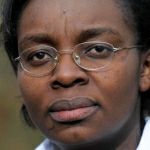
Victoire Ingabire - challenges Gen. Paul Kagame and RPF
In an open letter addressed to Gen. Paul Kagame, President of Rwanda, the opposition leader Mrs Victoire Ingabire Umuhoza challenges the RPF-led governement in these terms:
Kigali 21st March 2010
OPEN LETTER
To His Excellency Paul KAGAME
President of Rwanda
KIGALI
Excellency Mr. President,
I have the honour to address your high authority so that you may do everything in your power to ensure that all political organizations wishing to participate in the presidential elections scheduled for August 2010 can enjoy and exercise their full rights.
My political organisation, UDF-INKINGI has decided to take part in these elections in order to prove to all political contenders that political change in Rwanda is possible without resorting to violence as it has been the case up to now.
The Rwandan Patriotic Front (RPF) should not shy away from free political competition after holding power for 16 years, especially since it claims having achieved National Unity and Reconciliation and having brought about an unprecedented economic development.
The UDF-Inkingi agreed to comply with applicable laws for the registration of political parties in Rwanda.
It is important that our rights are guaranteed by the Constitution of Rwanda in particular, Articles 11, 16, 33, 35, 36, and statements stipulated in the UN Charter of 26 June 1945; the Universal Declaration of Human Rights of December 10, 1948; the International Covenant on Economic, Social and Cultural Rights of December 19, 1966; the International Covenant on Civil Rights and Policies of December 19, 1966; the African Charter on Human Rights and People of June 27, 1981; the African Charter on Democracy, Elections and Governance of January 30, 2007; all of which Rwanda has joined in good faith.
Since my return to the homeland, I am constantly victim of a campaign of vilification, harassment and intimidation orchestrated by public and partisan media, Public Administration and some members of
the government.
You may also know, Your Excellency Mr. President, that I have been assaulted in the offices of the administrative sector of Kinyinya on February 3, 2010. I have been many times summoned to the criminal investigation department for illegal political activities, genocide ideology and alleged contacts with FDLR rebellion. Despite of all those threats, I remain determined to defend my political rights and the rights of every Rwandan citizen, especially when these rights are
guaranteed by the Constitution.
I condemn in the strongest terms the genocide against the Tutsi, and other crimes against humanity committed in Rwanda.
I firmly believe that without compassion or rehabilitation of all victims, without prosecuting the authors of those horrible crimes, there is no chance to fight against impunity and no true reconciliation can be achieved.
I am also accused of alliance with the FDLR. The supporting material for the allegation is mainly based on a UN report of the Group of Experts on the Democratic Republic of Congo of November 23,
2009. It is not necessary to repeat that informants voluntarily induced the UN investigators into error by claiming that I have a family relationship with officials of the armed group.
It is indecent to exploit my participation in the meeting of the Intra-Rwandan Dialogue as a proof of my connection to the rebel group because I was invited along other members from different Rwandan organisations and members of your ruling party RPF which the report carefully and intentionally does not mention.
(http://www.veritasrwandaforum.org/dialeg/DIR06_fr.pdf).
The final remarks of this meeting seeking a peaceful solution to the political crisis in Rwanda were read by one of the genocide survivors
attending the meeting (http://www.veritasrwandaforum.org/dialeg/COMMUNIQUE_FINAL_DIALOGUE_INTRA.pdf).
Moreover when the government has made and continues to make contacts with members of the FDLR and has even incorporated some of FDLR generals in its army, one may clearly question the genuine reason behind such a witch-hunt.
As for legal aspects related to my applications to hold the constitutional congress of my political party, the position of the administration to deny the authorisation to convene is baseless.
Sections 18, 19 and 21 of the Constitution leave no shadow of doubt.
I cannot be deprived of my rights based on mere assumptions and facts to which I have not been charged nor convicted (Constitution, Art 19).
It is unusual that a government official, i.e. the Minister of Local Government, Mr. James Musoni, openly violates the law in his remarks aired by the VOA on March 15, 2010 claiming that as long as the police is investigating, there will be no authorisation for the UDF-INKINGI to convene anywhere in Rwanda.
Leave alone the fact that the above mentioned Minister has arrogated excessive powers to authorise political meetings while the Organic Law 16/2003, 27/06/2003 in its Article 5 speaks simply of �prior notice to the administrative authorities in writing� and only mentions the need for prior authorization in cases of public demonstrations (Article 5 paragraph 4).
In an interview with the national radio on March 12, 2010, the Mayor of Nyarugenge (Kigali) added: ďż˝We cannot allow them to meet, because we do not know what message they tell the publicďż˝, a statement she confirmed to BBC-Kinyarwanda – Kirundi on March 15, 2010. This is a blatant violation of basic constitutional rights of expression and association guaranteed by the Constitution and other legal instruments and international conventions.
The current controversial Organic Law No. 19/2007 of 04/05/2007 modifying and complementing Organic Law n ďż˝ 16/2003 of 27/06/2003 governing political organizations and politicians gives to the Minister of Local Administration jurisdiction of registration and public meetings of political organizations. It is the highest authority in the hierarchical system and the final decision is within its jurisdiction.
By refusing to UDF-Inkingi permission to hold its founding congress, the minister at the same time blocks the possibility for the party to register as a political party officially recognized because it would fail to specifically prove that it has been duly constituted.
We denounce this blatant abuse of power that violates the Constitution.
Excellency Mr. President,
All the above developments clearly show that the political process without your ultimate intervention and arbitration is derailing. It is your responsibility as guarantor of the Constitution and public institutions to take appropriate measures to ensure that:
- The government, its administration and institutions remain neutral and respect the laws and particularly the Constitution and the Article 29 of Organic Law No. 16/2003 of 27/06/2003;
- All Rwandans enjoy freely their political rights;
- Political parties fully exercise their rights of expression and association (Article 1 Organic Law No.
16/2003 of 27/06/2003);
- As also recognized by the RPF on 18/08/1992 in the Memorandum of Agreement on the rule of law in particular its chapter on democracy, Article 7 stated that both parties recognize that the multi system implies the legitimacy of the existence of a democratic opposition, and consider legitimate aspiration of all Rwandans to gain power by democratic means;
- The opposition parties have the political space that is needed and go toward the population to discuss their social projects;
- The UDF-Inkingi is allowed to hold the Constitutional Congress in accordance with applicable laws and without any further hindrance from the government.
Please accept, Excellency, the President, the assurances of my highest consideration.
Victoire Ingabire Umuhoza
Chair of UDF-Inkingi
Tel : (+250) 078583600 [email protected]
http://www.fdu-rwanda.org ďż˝ http://www.victoire2010.com
March 25, 2010 No Comments
Rwanda: FDU�s Ntawangundi Found �Guilty�, Denies Some Genocide Charges
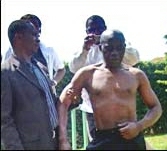
Joseph Ntawangundi, convicted of genocide charges
Kigali: Controversy still mares the Genocide conviction of opposition politician Mr. Ntawangundi Joseph ďż˝ in that at some stage he is fiercely contesting some charges but also accepting others. A weeklong marathon Gacaca court sitting in eastern Rwanda has sentenced him to a reduced term, but not without provoking more questions.
The drama-filled re-trail of Mr. Ntawangundi, who was an assistant for Victoire Ingabire Umuhoza, the United Democratic Forces Inkingi (UDF) chief ended Wednesday evening with a 17-year conviction. The original 2007 conviction was 19 years, and the panel of Gacaca judges did not explain why that had been reduced.
Mr. Ntawangundi�s file stated that he was the Principal of the Agro-veterinary school of Gitwe in Eastern province (EAVE-GITWE) at the time of the Tutsi Genocide and that he organized massacres of Tutsis in the institution. The judges found Mr. Ntawangundi guilty of also taking part in the killings himself.
However, all through the re-trail which started last week, the defendant explained that he never was the head of that school. He added that he was in Sweden during the genocide. Then what could be considered a bombshell, on March 19, he supposedly wrote a letter to the Gacaca panel making a U-Turn.
Amid a surprised crowd intently listening to the proceedings of the final day of the trail, the Gacaca panel said the defendant had accepted the charges, and that he was indeed at the said school during the massacres. Mr. Ntawangundi apparently in the letter also pleaded for forgiveness from the Gacaca panel.
But that was not the end of the case. As required by the Gacaca court system, before sentencing, the defendant is given time to say something. In a soft-spoken tone ďż˝ like it had been through the trial, Mr. Ntawangundi publicly confirmed that the person mentioned in the case was indeed him.
He also confirmed that he was at the school during the massacres, but added he had worked there for a short time. Mr. Ntawangundi also said he accepts responsibility for genocide crimes committed by his staff.
Around 20 witnesses had testified having seen the accused when the massacres took place. Amongst them, one presented himself as a former student, one said she was Mr. Ntawangundi’s servant and another one asserted she was his former partner. Other confessed killers themselves confirmed that the defendant ďż˝worked with usďż˝ ďż˝ meaning killed.
Mr. Ntawangundi also had disowned a woman who claims she has a 15-year old child whom she believes is their child.
However, in his last words before the verdict was read, Mr. Ntawangundi stunned the session when he denied killing anybody using his own hands. Speaking slowly and guardedly, he also denied having supervised anybody doing the killing.
According to him, he had been at the school for a short time and had not known well all the people working there by the time the Genocide started.
In a lengthy presentation of his final defense as about eight of his accusers looked on, Mr. Ntawangangi admitted that he indeed saw some of his staff killing Tutsis but that he had not given them any orders. I did not have any control over the killers, he said.
After the defense of his acts, the Gacaca judges led by Mr. Celestin Turinabo went into a closed-door session which also lasted about two hours to decide on the verdict.
On return, presiding court leader Mr. Turinabo said that Mr. Ntawangundi was guilty of two levels of Genocide ďż˝ on acts he committed as an individual, and for failing to reign in his staff as they rampaged killing Tutsis. The judge president went through the details of the case and eventually sentenced Mr. Ntawangundi to 17-years.
Though with a reduction of two years from the original sentence in absentia of 19 years, the Gacaca panel did not say why it had reduced the sentence. Speculation remained with those attending the proceedings who suggested that probably Ntawangundi�s letter had played a part.
Now detained in Kibungo’s Central prison, Joseph Ntawangundi was arrested in February on the grounds of a judgment delivered in 2007 by a Gitwe Gacaca court. The tribunal sentenced him in to 19 years in jail for complicity in the mass slaughter. He was allowed to ask for a rehearing trial as he had been judged as he lived in Europe.
Despite standing by her assistant, opposition party chief Ms. Ingabire was recently forced to withdraw her support. In a press release posted on February 8 on the FDU-Inkingi website, Ms. Ingabire claimed that her assistant was not present in Rwanda during the genocide.
The website read: ďż˝Joseph Ntawangundi left Rwanda in 1986 for studies in Poland (Wroclaw), returned to Rwanda in 1992 and worked in Kigali (CESTRAL). In 1993, he left Rwanda for ICFTU – AFRO (International Confederation for Free Trade Unions, African Regional Organization, NAIROBI, Kenya) as a Research and Training Officer until 2002. During the genocide, Mr. Joseph Ntawangundi was attending, on behalf of the ICFTU ďż˝ AFRO, a 2-month training course in Sweden (GANGNEF) and returned to Kenya”.
However, when the situation turned against her version of events, she changed her defense, instead saying Mr. Ntawangundi had not revealed his past to the party.
Following the verdict, the guilty Ntawangundi was taken back to jail and it is not clear if he will appeal because he still has several layers above.
[ARI-RNA]
March 25, 2010 No Comments
Rwanda-France: Nicolas Sarkozy Tries To Turn A ‘Painful Page’
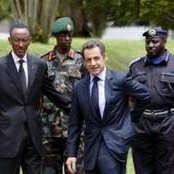 Photo op Nicolas Sarkozy with Gen. Kagame and his military commanders, all indicted by French Justice for crimes against humanity (feb. 2010)
Photo op Nicolas Sarkozy with Gen. Kagame and his military commanders, all indicted by French Justice for crimes against humanity (feb. 2010)When Mrs Agathe Habyarimana was arrested in France early this month, her detention opened another chapter in the world’s murkiest political murder mystery.
After spending 16 years in exile as the vulnerable widow of Rwanda’s assassinated Hutu President Juvenal Habyarimana — the first victim of Rwanda’s 1994 holocaust — she was suddenly charged with genocide, complicity in genocide, conspiracy to commit genocide, creation of a criminal gang, murder and public incitement to commit genocide.
Mrs. Habyarimana was held only briefly by French police, on an international warrant issued last year by Rwanda, before being granted bail. But her detention marked a dramatic turning point in the process of assigning blame for the murders of close to a million people.
France’s steadfast refusal to extradite wanted genocide suspects and its disinterest in pursuing them through French courts had long poisoned relations with Rwanda.
In fact, Mrs. Habyarimana was evacuated from Rwanda by French paratroopers just three days after her husband’s plane was shot down by a surface-to-air missile as it approached Kigali airport on April 6, 1994 — an assassination that ignited a frenzy of mass murder resulting in the deaths of between 800,000 and one million Rwandans in just 100 days.
During 16 years, France remained her patron and guardian, while downplaying its own role in the rwandan genocide and deflecting claims that it armed and trained the Rwandan militias that carried out the killings and sent soldiers and arms to support the Rwandan government during the mass murders.
A series of French governments repeatedly refused to arrest Mrs. Habyarimana as a perpetrator of the genocide, but they also repeatedly refused to grant her permanent residency status in France.
As recently as last October, French courts denied her refugee claim, citing serious suspicions she was involved “either as an instigator or accomplice” in the genocide.
But France’s official stand on the Rwandan genocide suddenly shifted last month when French President Nicolas Sarkozy became the first French head of state to visit Rwanda since 1994.
Ending a three-year diplomatic deep freeze and 15 years of acrimony over France’s responsibility for Rwanda’s terror, Mr. Sarkozy offered “to turn an extremely painful page” in relations between the two counties and admitted France made mistakes and “miscalculations” during the genocide.
“What happened here obliges the international community — including France — to reflect on the errors which prevented us from foreseeing, or stopping, this appalling crime,” Mr. Sarkozy said. “Errors of appreciation, political errors were committed here, which had absolutely tragic consequences. What happened here is a defeat for humanity.”
That was a dramatic climb down from previous French positions, in which the government claimed Tutsis rebels, led by Rwanda’s current President Paul Kagame — not France’s Hutu allies — triggered the genocide by shooting down Mr. Habyarimana’s plane.
In 2006, a French investigative judge, Jean-Louis Bruguiere, renowned for tracking down convicted terrorist Carlos the Jackal, indicted Mr. Paul Kagame and nine of his military commanders on charges of complicity in the murder of Mr. Habyarimana and his plane’s French flight crew.
The move infuriated President Kagame, who has always denied the accusation.
He immediately curtailed diplomatic relations with France, expelled French foreign aid workers and replaced French with English in Rwanda’s schools.
He even applied to gain admission to the British Commonwealth. (Rwanda became a member a day before Mr. Sarkozy’s visit to Kigali.)
Mr. Kagame also struck a special commission to investigate France’s involvement in the genocide and asked it “to determine whether to pursue legal action at the International Court of Justice.”
That report, tabled in August 2008, named 33 senior French military and political leaders who the Rwandans said should be prosecuted for crimes against humanity. The list included Mr. Mitterrand, then prime minister Edouard Balladur, former French foreign minister Alain Juppe and his then chief aide, Dominique de Villepin, a former foreign minister and French prime minister and Mr. Sarkozy’s chief political enemy.
Mr. de Villepin was deeply involved in French foreign policy in Rwanda, having been the head of the French foreign ministry’s Africa desk from 1991 to 1992, before becoming Mr. Juppe’s aide during the 1994 genocide.
As relations with Rwanda plunged into the deep freeze under Mr. de Villepin’s prime ministership, Mr. Sarkozy ran for president in 2007 on a promise to renew France’s pride in itself both at home and abroad.
He vowed to renew France’s relationship with Africa and to break with a past critics said was based on arrogant paternalism and long-standing ties with despots. As president, he acted on his promise, paying six visits to Africa in just three years.
As a leader with no personal connection to Rwanda’s tragedy, Mr. Sarkozy had a relatively free hand to seek renewed relations with Rwanda and sent his first official delegation to Kigali to discuss a rapprochement four months after he became president.
It hasn’t hurt that Judge Bruguiere’s case against Mr. Kagame has unravelled, with four crucial witnesses recanting their testimony, claiming it was manipulated or misused by senior French officials determined to indict Rwanda’s Tutsis rebels.
Earlier this month, Mr. Sarkozy’s government introduced a package of legal reforms that include a proposal to scrap France’s politically independent examining magistrates, like Judge Bruguiere, who is now retired.
Included in that reform package is a proposal to set up a special judicial unit in the Paris High Court to deal with charges of genocide, war crimes and crimes against humanity.
The aim is to consolidate the expertise needed in complicated war crimes cases in one office and “to speed up judicial treatment of war crimes and genocide cases.”
Rwandan genocide survivors have already laid charges against 16 people in France, but none of the cases has ever come to trial.
News of the new war crimes unit broke the same day Mr. Kouchner travelled to Rwanda to make final arrangements for Mr. Sarkozy’s historic visit.
It was no coincidence Rwanda released a new 700-page report on Mr. Habyarimana’s murder just a day after Mr. Kouchner left.
Drawing on two years of research, 600 witnesses and a panel of ‘independent’ British ballistics experts who studied the missile attack on the Rwandan president’s plane, the report concludes Hutu extremists, some of whom were close to Mrs. Habyarimana, killed their own leader to stop him implementing a power-sharing agreement with Tutsis rebels under the Arusha Peace Accords. The murder served as a trigger for the genocide.
Without commenting on the new Rwandan findings, while proceeding with renewed diplomatic relations and moving to arrest Mrs. Habyarimana, France appears to have tacitly accepted Rwanda’s conclusions.
[National Post]
March 25, 2010 No Comments
Felicien Kabuga: The Most Wanted Man in Africa
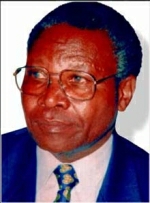
Kabuga: the most wanted man in Africa
Felicien Kabuga
The most wanted man in Africa is accused of being the driving force behind one of the worst genocides in human history.
The International Criminal Tribunal for Rwanda (ICTR) is seeking Kabuga for “serious offences under the 1949 Geneva Conventions, crimes against humanity and genocide,” in connection with the massacre of over 800,000 Rwanda men woman and children in 100 days of terror in 1994.
The rich businessman is accused of bankrolling the Hutu militias that committed the murders. Kabuga owned also the majority of shares in a local radio station (RTLM) which propagated extremist ideology and incited violence against the Tutsi population of Rwanda. He is also accused of having provided weapons, uniforms and transportation that assisted the militias and made massive purchases of machetes and hoes that were used as weapons.
Kabuga fled Rwanda and was believed to be elsewhere in Africa, possibly Kenya.
Rwanda says that they no longer believe Kabuga is in Kenya. (Rwanda says genocide fugitive Kabuga �not in Kenya�).
March 25, 2010 No Comments
Rwanda: Arrest Warrants Issued for Kayumba and Karegeya
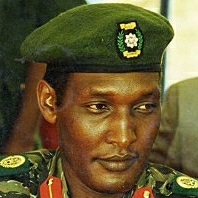
Fugitive Gen Kayumba Nyamwasa
Kigali ďż˝ A highly placed source in the Prosecutor General’s office has revealed to The New Times that the government has issued international arrest warrants against Lt. Gen. Kayumba Nyamwasa and Patrick Karegeya, who are believed to be behind recent terrorist activities in and around Kigali. The two fled to South Africa.
The source, added that, extradition requests had already been sent to South African authorities. “The charges include terrorism and creating a terror criminal organisation,” the source said. “Interpol has already been alerted.” “We have assured the South Africans that the two fugitives would receive a fair hearing and will be treated in line with international humanitarian law,” the source added.
On February 19, three grenades were hurled at various bus stands around the city, killing two people and wounding 28. Prosecution has confirmed that they have testimonies from several witnesses, who link the attacks to Kayumba and Karegyeya. Kayumba, the former High Commissioner to India, fled the country immediately after the attacks. He passed through Uganda and proceeded to join Karegyeya in South Africa.
Once extradited, the two suspects will be tried in the High Court at First Instance and appeals would be heard by the Supreme Court.
AllAfrica
March 25, 2010 2 Comments
